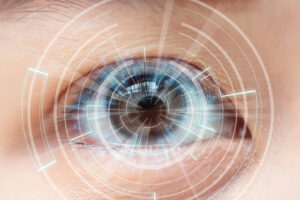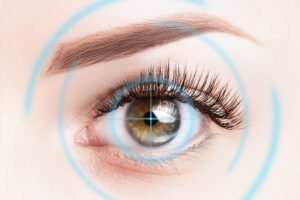
Having a night vision problem, or any other vision problem for that matter, is a major issue on a global scale. As of 2015, there were approximately 253 million people with visual impairment. 36 million consists of blind persons, and 217 million represent people with moderate to severe eye problems.
Vision problems can be treated if detected early, but the treatment becomes more complicated with less chance of full vision recovery if diagnosed later. It is advisable to get your eyes checked regularly, especially if you detect any changes in your vision or if you need dry eyes treatment.
What Causes Blurry Vision At Night?

The eye itself is made up of different sections, and each of the units has its functionality. We have the pupil, sclera, lens, retina, cornea, etc. The pupil is the black ball that you see inside the eye.
The pupil’s job is to control the amount of light entering the eye. When too much light enters the eye, the pupil shrinks, and when there’s less light, it expands to include as much light as possible to give us a clear picture of what we’re looking at.
Low light vision or nyctalopia is a problem that affects the eyes during the night because of the change of light around us. During the day, the eyes function as they should, but when dawn sets, or when there’s not enough light, the vision becomes blurred, making the person not see clearly or at all.
If you have a deficiency in vitamin A, you are more likely to get affected by night blindness, also known as nyctalopia.
Cataracts can cause blurred vision at night as well. As you age, the lens cells die and form a foggy white substance that spreads on the pupil, causing a night vision problem.
Exposing your eyes to too much light can also lead to nyctalopia. It happens because the cornea and the pupil will get damaged, and the pupil will not control the needed light. It’s advisable to put on sunglasses when there’s a lot of sun/light in the surrounding area.
For the light to enter the eye, it needs to bend to go straight to the retina, where the image is formed. Sometimes, the shape of the eye makes it hard for the light to bend. It is known as refractive error, and this causes bad vision at night.
The retina is a prominent part of the eye. When the light enters the eye, it goes straight to the retina. Photoreceptors are special cells found in the retina which convert the light into electrical signals. The signals travel to the brain and form the image you are viewing. When the retina gets damaged, you can quickly get blurry vision at night.
There is a section known as the optic nerve in the human eye. The optic nerve does the work of connecting the eye to the brain. The optic nerve transports the impulse formed in the retina to the brain for image interpretation.
The optic nerve can be damaged if the eye is exposed to excessive light. Excessive light narrows the nerves causing a lot of pressure in the optic nerve, disabling its impulsing image to the brain. This condition is called glaucoma, and it causes blurry vision at night as well.
Zinc plays a significant role in eye health. Just like vitamin A deficiency, a deficiency of zinc can cause low light vision as well.
What Is The Treatment Process For Low Light Vision?
If any disease or eye condition is diagnosed at early stages, the chances of treatment are much higher than waiting for other symptoms to show themselves. If you visit any Lasik Center of Manhattan, you’ll need to undergo various tests and examinations for the doctor to find the reason why you’re experiencing what you’re experiencing.
When it comes to nyctalopia, the treatment mostly depends on the cause of the night vision problem. We went through some of the most common causes for bad vision at night, so we’ll go over the treatment options for each of these causes.
Glaucoma is treatable if detected early. The disease causes damage to the optic nerve where excessive pressure is exerted on the nerve. It can be corrected in different ways.
The doctor can prescribe eye drops or insist on microsurgery to ease the pressure on the optic nerve.
The deficiency of supplements and vitamins such as zinc and vitamin A can be treated by consuming food rich in these vitamins and minerals. Sources of vitamin A include eggs, oily fish, milk, yogurt, carrots, and many others. If there’s a more serious deficiency, you can also try food supplements with much higher required nutrient levels than regular food.
Cataract problems can be treated by minor surgery. However, if diagnosed earlier, it can be corrected using eye spectacles. The spectacles should clear the cloudy vision, making it better overall. If the case is much worse, the only solution is to undergo minor surgery. In this surgery, the lens in the eye can be removed and replaced by an artificial one.
Dryness of the eye is a minor issue. This can be treated in various ways, but the most common is by prescription artificial tears. If the dryness persists, a doctor can ask for further tests that will find the cause of eye dryness and prevent blurry vision at night from happening.
How To Prevent Night Blindness?

There’s, unfortunately, nothing one can do to make sure night blindness won’t happen, especially if the disease runs in your family and you have genetic predispositions.
There are things you can do to reduce the possibility of getting night blindness. Eating foods rich in vitamin A is a great way of reducing the possibility of having vision issues. Foods rich in vitamin A include carrots, cantaloupes, spinach, milk, eggs, and many more. Thanks to the world wide web, a quick browser search is enough to find the foods rich with nutrients you need to improve your overall health.
Regularly exercising is also known to have positive effects on overall health and vision. Exercise can lower eye pressure and blood glucose levels, the most common triggers for vision problems.
As mentioned, exposing your eyes to direct sunlight can cause damage to the eyes. Wearing sunglasses with proper UVA and UVB protection will reduce the possibility of getting glaucoma or cataracts.
Last but not least, going for regular checkups is a great way to catch any type of issue in the early stages. Professionals such as Diamond Vision Lasik Center are a great choice because regular appointments can prevent more serious issues if symptoms are left untreated.
If you’re experiencing any difficulties seeing during the night or in a dimmed-light atmosphere, or you know someone with these types of symptoms, make sure to share this article with them via social media.
Contact Us
If you have more questions about LASIK procedures, get in touch with us.
Related Blogs

Timing is Everything: When to Consider LASIK After Nursing for Optimal Results
Timing is everything when considering LASIK eye surgery after nursing, and understanding the optimal period for this procedure is vital for both mother and baby.

Cataract Surgery: Restoring Clarity and Confidence
Cataract surgery is a transformative procedure that offers a new lease on clear vision and renewed confidence. As cataracts cloud the eye’s lens, causing blurred

Intralase LASIK Explained: What to Expect Before, During, and After the Procedure
Intralase LASIK is a cutting-edge procedure that offers a safe, effective, and precise way to enhance vision compared to traditional LASIK methods. Understanding what to
